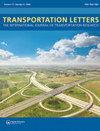Electric vehicles in emergencies and evacuations: a review of resilience and future research directions
IF 3.3
3区 工程技术
Q2 TRANSPORTATION
Transportation Letters-The International Journal of Transportation Research
Pub Date : 2025-07-03
DOI:10.1080/19427867.2024.2415753
引用次数: 0
Abstract
Disasters often require large-scale evacuations, and damage key infrastructure (e.g., power, transportation). With growing electric vehicle (EV) adoption and electrification of transportation, governments and utilities may face significant power challenges during disasters, especially during the evacuation stage. Low state-of-charge, sporadic charging infrastructure, or power outages could significantly hamper safe and effective evacuations. Yet, EVs also offer possible resilience benefits to emergency response by more easily charging electronics or sending power back to the grid through vehicle-to-grid (V2G) technology. This paper focuses on the opportunities, benefits, and drawbacks of EVs in disasters and evacuations through a systematic review of current literature, reports, and sources. Overall, this review discovered EVs show promise as modes of transportation and mobile energy supply units. However, crucial challenges such as charging infrastructure locations, upfront cost of resilience technologies, and user behavior necessitate more dedicated research to overcome shortcomings and guide more realistic implementation of benefits.
紧急情况和疏散中的电动汽车:弹性回顾和未来研究方向
灾害通常需要大规模疏散,并破坏关键基础设施(如电力、交通)。随着电动汽车(EV)的普及和交通工具的电气化,政府和公用事业公司在灾害期间可能面临重大的电力挑战,特别是在疏散阶段。低电量状态、零星充电基础设施或停电可能严重妨碍安全有效的疏散。然而,电动汽车还可以通过更容易地为电子设备充电或通过车辆对电网(V2G)技术将电力发回电网,从而在应急响应方面提供可能的弹性优势。本文通过对当前文献、报告和来源的系统回顾,重点介绍了电动汽车在灾害和疏散中的机会、好处和缺点。总的来说,这篇综述发现电动汽车作为一种交通方式和移动能源供应单元是有希望的。然而,诸如充电基础设施位置、弹性技术的前期成本和用户行为等关键挑战需要更专门的研究来克服缺点,并指导更现实的效益实现。
本文章由计算机程序翻译,如有差异,请以英文原文为准。
求助全文
约1分钟内获得全文
求助全文
来源期刊

Transportation Letters-The International Journal of Transportation Research
TRANSPORTATION SCIENCE & TECHNOLOGY-
CiteScore
6.40
自引率
14.30%
发文量
79
审稿时长
>12 weeks
期刊介绍:
Transportation Letters: The International Journal of Transportation Research is a quarterly journal that publishes high-quality peer-reviewed and mini-review papers as well as technical notes and book reviews on the state-of-the-art in transportation research.
The focus of Transportation Letters is on analytical and empirical findings, methodological papers, and theoretical and conceptual insights across all areas of research. Review resource papers that merge descriptions of the state-of-the-art with innovative and new methodological, theoretical, and conceptual insights spanning all areas of transportation research are invited and of particular interest.
 求助内容:
求助内容: 应助结果提醒方式:
应助结果提醒方式:


